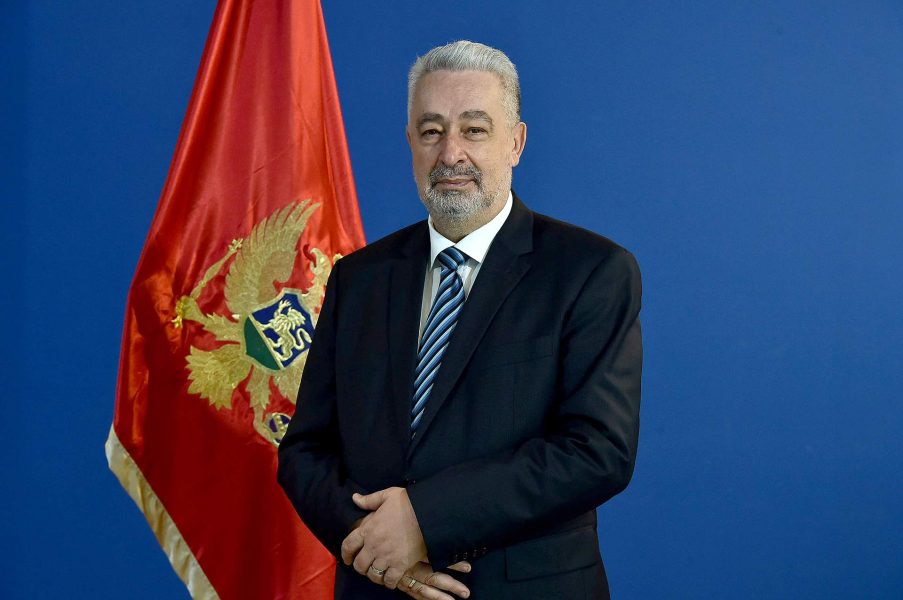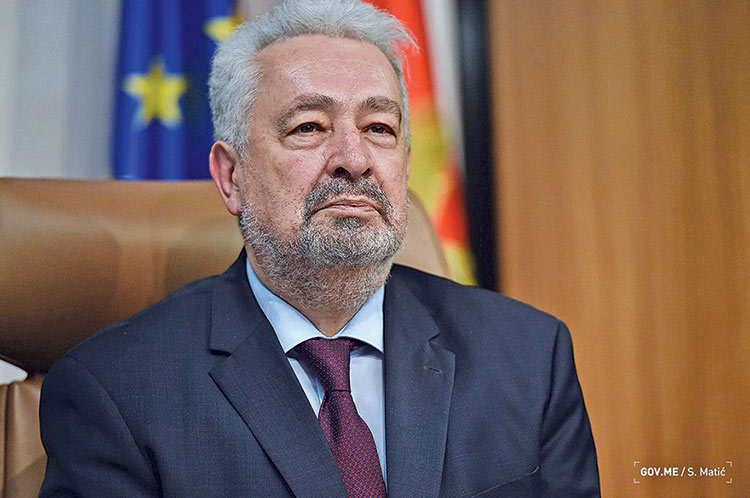With the exceptions of attempts to verbally interfere in the internal affairs of Montenegro, and certain media addresses, among less important individuals from Serbia’s state apparatus, we don’t see any serious, official attempts of Serbia to meddle in Montenegro’s sovereign issues and internal affairs ~ Zdravko Krivokapić
The first official visit of the Montenegrin Prime Minister to Serbia proved successful and – despite having started with a protocol gaffe that attracted a lot of public attention in both countries – will contribute to “relations between the two countries improving and restarting on a new and healthy footing,” says Montenegrin Prime Minister Zdravko Krivokapić in this interview for CorD Magazine, before confirming that the agenda didn’t include numerous unresolved issues pertaining to bilateral relations and announcing the first joint government session, to be held in late December or early 2022.
Summarising your impressions following your first visit to Belgrade in your capacity as Prime Minister of Montenegro, do you consider it as being that so-called “measured step” towards improving relations?
I absolutely consider it in that way. It is unnatural for relations between Montenegro and Serbia to be of a poor or average quality. We want the best possible relations with Serbia. We spent almost 90 years living in the same country, and even prior to that our relations were marked by strong historical ties. The role model for this relationship could be the relationship between the Czech and Slovak republics, or between Germany and Austria. It is to be understood that we want the best possible relations with all countries of the former Yugoslavia and the region. A good neighbourhood policy is our imperative, particularly in the context of the shared European perspective of the entire region.
There has been lots said about the protocol of your welcome to Belgrade. Has that issue been resolved through an apology from the Prime Minister of Serbia?
It is not under my jurisdiction to interpret the possible protocol omissions of our hosts, regardless of the country in question. I have stated publicly that the warm and pleasant welcome I received from Deputy Prime Minister Nedimović says more than whether or not he was wearing jeans. This government is much more interested in having as many tourists as possible coming from Serbia to Montenegro next summer, or in reaching a trade exchange of a billion euros, than it’s interested in whether or not someone wore jeans.
The inherited disputes and unresolved issues between Montenegro and Serbia have lasted for at least 15 years. From dual citizenship, via payment transactions, to the Marović case. These problems cannot be solved over a two-day visit, regardless of the public’s expectations
Has agreement already been reached on the date of the announced joint session of the two governments?
It has been proposed that the first joint session of the two governments be organised on the Montenegrin coast, in late December this year or early January next year. The exact date has not yet been defined, but I believe it will be soon.
You explained in your address to the media that your visit was focused on the renewal of bilateral relations, which is way the agenda didn’t include unresolved and contentious issues like dual citizenship, the status of Serbian and Montenegrin ambassadors or Montenegro’s extradition request for Svetozar Marović. When will these issues be discussed and what position will the Government of Montenegro take?
If the visit to Belgrade only raised issues on which Montenegro and Serbia differ, that visit would last at least a week, while discussions between the two delegations would turn into negotiations that would require a special conference for resolving the disputes between the two countries. The inherited disputes and unresolved issues between Montenegro and Serbia have lasted for at least 15 years. From dual citizenship, via payment transactions, to the Marović case. These problems cannot be solved over a two-day visit, regardless of the public’s expectations. During the visit, thus, both sides expressed a mutual desire to improve relations between the two countries and restart them on a new and healthy footing.

You made a guest appearance at the talks held between leaders of Serbia, Albania and North Macedonia within the scope of the Open Balkan initiative. The previous Montenegrin government expressed its reservations towards this regional project, explaining that all energy should be directed towards the EU accession process. What is your stance?
This Government’s ambition is to complete the process of negotiating accession to the EU by 2024. As the most advanced EU membership candidate country, we are focused on our integration agenda. In terms of regional initiatives, we already have the Berlin Process, the Regional Cooperation Council and CEFTA, which represent excellent multilateral “umbrellas” for the region’s fastest possible integration into the EU. If the Open Balkan initiative fits this framework, it is very welcome, and we will continue monitoring its development carefully.
When it comes to the establishing of new relations between the government in Podgorica and the Serbian Orthodox Church, the public in both countries expect some kind of final step, in the form of the signing of the so-called ‘Fundamental Agreement’. Although this agreement has been announced several times, there has so far been no signing. Do you think that will happen soon and what does it depend on?
At this juncture it depends on the Patriarchate. We have adapted the proposed Fundamental Agreement to suit our constitutional and legal framework and submitted it to the Patriarchate, whose response we are awaiting patiently.
In terms of regional initiatives, we already have the Berlin Process, the Regional Cooperation Council and CEFTA, which represent excellent multilateral “umbrellas” for the region’s fastest possible integration into the EU. If the Open Balkan initiative fits this framework, it is very welcome, and we will continue monitoring its development carefully
Following the change of government in Montenegro, did the West apply any pressure on the new government to keep Belgrade at a distance?
There was absolutely no pressure. My visit to Belgrade testifies to that. When it comes to advancing good neighbourly cooperation in the Western Balkans, we’ve always received words of encouragement from our friends and allies in the West.
How would you comment on the theory circulating among sections of the public in both countries regarding Serbia’s alleged meddling in Montenegro’s internal affairs, which most commonly claim that the Serbian Orthodox Church is the central column of that undue influence?
With the exceptions of attempts to verbally interfere in the internal affairs of Montenegro, and certain media addresses, among less important individuals from Serbia’s state apparatus, we don’t see any serious, official attempts of Serbia to meddle in Montenegro’s sovereign issues and internal affairs. If the situation was different, I certainly wouldn’t go on an official visit to the Republic of Serbia.

I equally don’t think that the Serbian Orthodox Church represents a column of any kind of undue influence. Orthodox dioceses on the territory of Montenegro are, viewed canonically, self-contained and completely grounded – historically and in any other way – in the essence Montenegrin statehood, and thus cannot be treated as a product of any external factor or foreign influence.
You’ve announced your expectation that – following the review of school programmes in Montenegro – the Yugoslav and Serbian writers whose works were previously omitted will be returned to the teaching curriculum. Will the possible returns of Njegoš, Desanka Maksimović, Aleksa Šantic and Meša Selimović be interpreted as an educational issue or a political one?
Malicious, ill-intentioned people will always convert such issues into political ones. However, those well-meaning, educated and wise people, who’ve read the aforementioned authors and are familiar with their literary value, will never resort to such politicisation.
I don’t think that the Serbian Orthodox Church represents a column of any kind of undue influence. Orthodox dioceses on the territory of Montenegro are, viewed canonically, self-contained and completely grounded – historically and in any other way – in the essence Montenegrin statehood, and thus cannot be treated as a product of any external factor or foreign influence
By the time the new issue of CorD Magazine is released in December, we should also know the fate of your government, the reconstruction of which is being sought by certain political players who claim the only alternative would be new elections. Will your government survive; and what are you prepared to possibly change?
When your February issue comes out, the minimum monthly income in Montenegro will be 450 euros, and the average will be 700 euros. That is what interests this Government, and me as Prime Minister. We are interested in results, not armchairs. I’ve already shown an openness towards others to participate in these results, though this idea was rejected by the largest constituent of the parliamentary majority. At this juncture, I simply don’t have the time to consider whether the Government will survive or not. As I said, I’m primarily focused on results.
| RELATIONS It is unnatural for relations between Montenegro and Serbia to be of a poor or average quality. We want the best possible relations with Serbia | FUNDAMENTAL AGREEMENT We have proposed and submitted to the Patriarchate a Fundamental Agreement to suit our constitutional and legal framework and we now await their response patiently | FOCUS At this juncture, I simply don’t have the time to consider whether the Government will survive or not. As I said, I’m primarily focused on results |
|---|